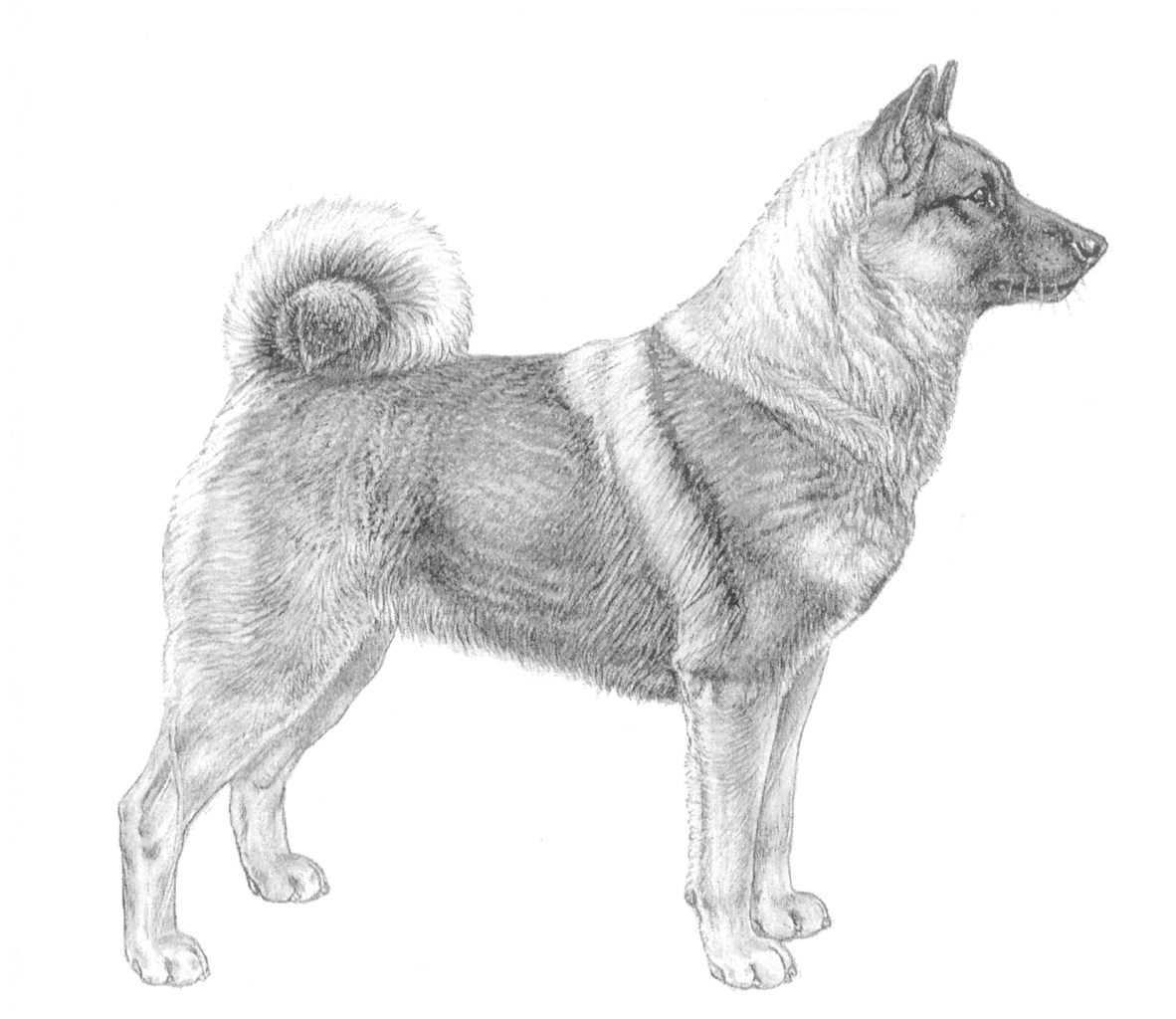 | Fédération Cynologique Internationale |
FCI-Standard N° 242
Norwegian Elkhound Grey
(Norsk Elghund Grå)
These illustrations do not necessarily show the ideal example of the breed.
The sequence might differ slightly from the original breed standard.
ORIGIN
: Norway.DATE OF PUBLICATION OF THE OFFICIAL VALID STANDARD
: 09.08.1999.UTILISATION
: Dog for elk-hunting.FCI-CLASSIFICATION
:| Group 5 | Spitz and primitive types |
| Section 2 | Nordic Hunting Dogs |
| Working trial only for the nordic countries (Sweden, No | |
TRANSLATION
: Norsk Kennel Klub.GENERAL APPEARANCE
: A typical Spitz. Compact and short body, squarely built. Elastic, good rise of neck. Erect ears. Coat thick and abundant, but not bristling or long. Tail is tightly curled over the back.IMPORTANT PROPORTIONS
: Squarely built. Length of skull and length of muzzle identical.BEHAVIOUR / TEMPERAMENT
: Fearless, energetic, brave.HEAD
:CRANIAL REGION
: Wedge-shaped, relatively broad between the ears. Lean.Skull
: Slightly arched.Stop
: Marked, but too pronounced.FACIAL REGION
:Nose
: Black.Muzzle
: Gradually tapering either seen from above or from the side. Bridge of nose straight.Lips
: Tightly closed.Jaws/Teeth
: Scissor bite. Complete dentition.Eyes
: Not prominent, dark brown in colour.Ears
: Set on high, firm and upstanding, relatively small. Height slightly greater than their width at the base, pointed and very mobile.NECK
: Of medium length, firm, good rise of neck, abundant ruff without loose skin.BODY
: Strong, short in the couplings.Topline
: Straight from the withers to the tail set.Withers
: Well developed.Back
: Strong, muscular and straight.Loin
: Well developed.Croup
: Strong and broad.Chest
: Broad and deep, good spring of ribs.Underline and belly
: Almost straight.TAIL
: Set-on high, strong. Relatively short. Thick coat but not with a flag. Firmly curled over the center line, not carried on either side of the back. The tip cannot be straightened out on the adult dog.LIMBS
:FOREQUARTERS
: Strong and firm, straight.Shoulder
: Sloping.Upper Arm
: Moderately sloping.Elbow
: Well set in, turned neither in nor out.Forearm
: Straight seen both from the front and from the side.Pastern
: Straight seen from the front, moderately sloping seen from the side.FEET
:Forefeet
: Rather small, compact, toes pointing forwards.Hind feet
: Relatively small. Oval in shape, compact, toes pointed forward.HINDQUARTERS
: Strong lean and muscular. Parallel seen from behind. Moderately angulated.Thigh
: Muscular and broad.Stifle
: Moderately angulated.Lower thigh
: Of medium length.Hock joint
: Moderately angulated.Hock
: Must not reach behind the set of tail when standing.GAIT / MOVEMENT
: Light and effortless. Parallel seen both from the front and behind.SKIN
: Firm, without wrinkles on the head.COAT
:HAIR
: Of medium length; thick, coarse, abundant outer coat without curls. On head and the front of legs short and smooth; longest on neck, thigh, back of legs and tail. Soft undercoat.COLOUR
: Grey, of various shades. The colour is made by the black tips of the hair of the outer coat. Lighter on chest, belly, legs and on the underside of the tail, under the tail set and in the « harness marking ». The harness marking is about a 5 cm broad stripe from the withers to the elbow, where the outer coat lacks black tips. The ears and the front of the muzzle are dark (dark mask). The dark line from the eye to the set on of ears delimits the mask. Light grey undercoat.SIZE
:Height at withers
:Males Ideal height 52 cm.
Females Ideal height 49 cm.
FAULTS
:Any departure from the foregoing points should be considered a fault and the seriousness with which the fault should be regarded should be in exact proportion to its degree and its effect upon the health and welfare of the dog.
- Round or domed skull.
- Pointed or short muzzle.
- Pincer bite, irregular bite.
- Light eyes.
- Too big or too broad ears.
- Tail too short, not firmly curled, tail carried on the side.
- Flat feet.
- Too long or too short undercoat.
- Colour in brown or yellow. Dark undercoat. Sooty colour.
- White on tail tip. White on chest.
- Weak or nervous temperament.
DISQUALIFYING FAULTS
:Aggressive or overly shy.Over-or undershot bite.Yellow or blue eyes.Ears not erect.Naturally short tail.Dewclaws on hindlegs.Any variety in colour other than grey.Height at withers under 3 cm or over 4 cm from the ideal height.Any dog clearly showing physical or behavioural abnormalities shall be disqualified.
